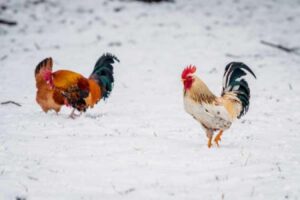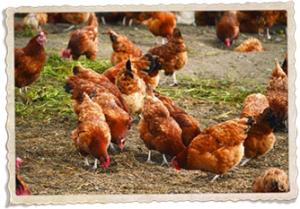 The cool nip in the air, the first frost on the grass, and the reduced daylight can only mean one thing: winter is coming. And for those with backyard chickens, it’s a time when our protective instincts might kick into overdrive.
The cool nip in the air, the first frost on the grass, and the reduced daylight can only mean one thing: winter is coming. And for those with backyard chickens, it’s a time when our protective instincts might kick into overdrive.
Your immediate thought might be that you need to keep your chickens warm. While making sure your chickens are prepared for winter is important, it’s key to remember that they don’t require the same level of protection that we do as humans. For example, we need heating and insulation in our homes, but those are both actually detrimental to chickens. Here’s why:
Nature Knows Best: Chickens are Hardy Birds
It’s easy to humanize our pets and livestock, projecting our feelings and personalities onto them. However, we must remember that chickens, by nature, are incredibly resilient to cold temperatures.
- Feathers as Insulators: Chickens have an excellent built-in insulation system: their feathers. When fluffed up, these feathers trap air, creating a warm layer that shields the birds from cold. They also have a high metabolic rate during winter, producing additional body heat.
- Huddling for Warmth: You might often find your flock huddling together, sharing body warmth. This natural behavior is an effective method to combat cold nights.
- Acclimatization: Chickens gradually acclimate to dropping temperatures. As the seasons change from summer to fall and then to winter, they undergo physiological changes, preparing them for the cold. Introducing artificial warmth can interfere with this natural acclimatization process.
The Risks of Artificial Heating
While it might seem like a kind gesture, adding a heater to the coop can pose significant risks.
- Fire Hazard: A coop, often made of wood and filled with straw or shavings, is a potential fire hazard. Introducing heating elements, especially in a confined space, can increase the risk of fires.
- Dependency: Over time, your chickens might become dependent on the artificial warmth. In case of a power outage or heater malfunction during a particularly cold night, the sudden temperature drop can be more harmful to the birds than the consistent cold.
- Moisture Build-up: Warm environments can lead to moisture accumulation, especially if the coop is not well-ventilated. Damp conditions are a breeding ground for pathogens and can lead to respiratory issues in chickens.
Why Traditional Insulation Might Not Be Ideal
Insulating a coop might seem like the middle ground between leaving it bare and heating it. But there are reasons to reconsider.
- Ventilation Issues: An overly insulated coop can restrict airflow. Proper ventilation ensures that any moisture from the chickens’ breath and droppings is expelled, maintaining a dry environment.
- Mold Growth: Insulating materials can trap moisture, leading to mold growth. Mold is detrimental to both human and chicken health and can lead to respiratory problems.
- Pest Nesting: Insulating materials can also become nesting grounds for pests like mites and lice. Once these pests establish themselves, they can be challenging to eradicate.
Nature has equipped chickens with everything they need to weather the cold. Rather than intervening with artificial means, our role should be to support their natural defenses. Ensure that the coop is dry, well-ventilated, and free from drafts. Offer a balanced diet and provide fresh water. And most importantly, trust in their innate ability to thrive.
For those of you considering the idea of introducing chickens to your backyard or expanding your flock, remember: choosing the right birds makes all the difference. Chickens for Backyards offers a diverse range of breeds, each with its unique characteristics and adaptability features. By making an informed choice, you set the stage for a healthy, thriving flock, irrespective of the season. Contact us to get started today!

